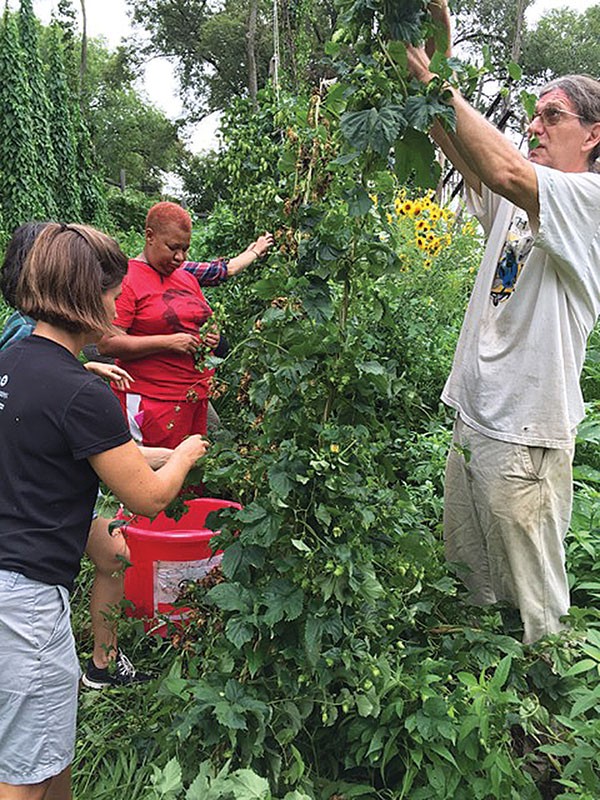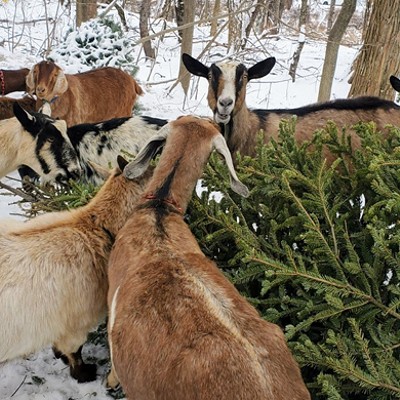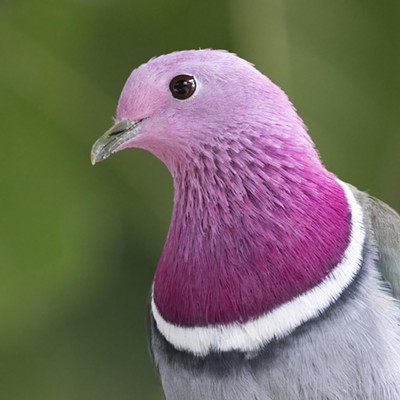A renowned expert, a local experiment in permaculture
“Be in tune with nature while being productive.”

Darrell Frey (at right) and volunteers at Garfield Community Farm
[
{
"name": "Local Action Unit",
"component": "24929589",
"insertPoint": "3",
"requiredCountToDisplay": "1"
}
]
Once, the five-acre patch of Mercer County land looked like a “farm”: corn — just corn — in long, straight rows. But when Darrell Frey was through, the cornstalks were scaled back and his Three Sisters Farm had a pond, fruit trees, contoured garden beds, chickens, a bioshelter (passively heated greenhouse) and more. And instead of $500 worth of corn, he was selling up to $40,000 in produce that included a coveted salad mix featuring wild edibles.
Frey is a nationally known expert on permaculture, the practice of doing agriculture sustainably, using minimal outside resources, and mimicking and working with rather than against nature. On sabbatical from Three Sisters, which he started in 1983, he’s now living in Pittsburgh and managing another local experiment in permaculture: Garfield Community Farm, 2.5 acres of largely wooded green space in the middle of Pittsburgh.
Permaculture follows commonsense (if not universally practiced) rules like eliminating waste and using renewable resources — mulching instead of watering heavily, for example. But in practice, Frey says, it’s mostly about observing the land to see what works, and designing small man-made ecosystems to get the most from that land while renewing the soil and other resources, rather than depleting them like conventional farming does. A permaculture forest garden, for instance, might include large fruit and nut trees for shade; a layer of smaller fruit trees; a shrub layer (currants and berries); an herbaceous layer (herbs, etc.); root vegetables; the soil surface (ground cover, strawberries); a vertical layer (vines); and fungi for soil health.
That’s no conventional orchard. But it echoes the traditional practices of subsistence farmers, from whom pioneers like the late Bill Mollison adapted the principles of modern permaculture starting in the 1970s. Frey’s farm was named for the “three sisters” of Native American agriculture: cornstalks provided trellises for beans that hold nitrogen in the soil, and squash kept weeds down.
Frey believes that we need small-scale, local permaculture farming to ensure food security and restore the health of the environment. “Be in tune with nature while being productive,” says Frey, author of the 2010 book Bioshelter Market Garden and a board member of the Permaculture Institute of North America. The Permaculture Worldwide Network identifies about 2,300 permaculture projects globally, including nearly 500 in the U.S. alone. Since 2011, Frey himself has certified more than 100 students in his course Permaculture Design, taught through Phipps Conservatory.
On a recent Saturday, about 15 students attended a day-long Urban Permaculture Intensive with Frey and Garfield Community Farm director John Creasy. In the hills above Penn Avenue, participants toured the herb garden (which doubles as a meditation labyrinth), where some “weeds” are left alone because they attract beneficial insects, including pollinators, and serve as ground cover. The students witnessed the dynamic form of composting known as hugelkultur: raised beds filled with nutrient-rich, water-retaining rotting wood. Elsewhere on the farm, careful co-plantings — like garlic, basil and marigolds with tomatoes — repel pests without toxic chemicals. And then there’s the farm’s own off-the-grid, solar-powered, rainwater-collecting bioshelter (modeled on the larger example at Three Sisters), where chickens cohabitate year-round with dwarf banana trees, and with micro-greens that sell to local restaurants for $3 an ounce.
Attendee Madelaine Dusseau volunteers on the farm and had previously taken permaculture classes with Creasy. She’s replacing her Swissvale lawn with other plants, from ligonberries to squash, but acknowledges that doing it right takes time. “The idea of observing and being patient … is definitely a permaculture concept,” she says.
Creasy runs Garfield Community Farm as part of his job as a pastor at nearby Open Door Church; he works with farm manager Frey, part-time staffer A.J. Bisesi and dozens of volunteers. Creasy founded the farm in 2008 to provide fresh organic produce to neighbors who have little access. His team reclaimed the overgrown lots from invasive knotweed; the farm now operates a mobile farmstand and runs youth and educational programming.
Creasy says that what excited him about permaculture was the symbiosis of community values and ecological stewardship. In permaculture, he says, “caring for the earth and caring for people becomes really the same thing.”
Frey is a nationally known expert on permaculture, the practice of doing agriculture sustainably, using minimal outside resources, and mimicking and working with rather than against nature. On sabbatical from Three Sisters, which he started in 1983, he’s now living in Pittsburgh and managing another local experiment in permaculture: Garfield Community Farm, 2.5 acres of largely wooded green space in the middle of Pittsburgh.
Permaculture follows commonsense (if not universally practiced) rules like eliminating waste and using renewable resources — mulching instead of watering heavily, for example. But in practice, Frey says, it’s mostly about observing the land to see what works, and designing small man-made ecosystems to get the most from that land while renewing the soil and other resources, rather than depleting them like conventional farming does. A permaculture forest garden, for instance, might include large fruit and nut trees for shade; a layer of smaller fruit trees; a shrub layer (currants and berries); an herbaceous layer (herbs, etc.); root vegetables; the soil surface (ground cover, strawberries); a vertical layer (vines); and fungi for soil health.
That’s no conventional orchard. But it echoes the traditional practices of subsistence farmers, from whom pioneers like the late Bill Mollison adapted the principles of modern permaculture starting in the 1970s. Frey’s farm was named for the “three sisters” of Native American agriculture: cornstalks provided trellises for beans that hold nitrogen in the soil, and squash kept weeds down.
Frey believes that we need small-scale, local permaculture farming to ensure food security and restore the health of the environment. “Be in tune with nature while being productive,” says Frey, author of the 2010 book Bioshelter Market Garden and a board member of the Permaculture Institute of North America. The Permaculture Worldwide Network identifies about 2,300 permaculture projects globally, including nearly 500 in the U.S. alone. Since 2011, Frey himself has certified more than 100 students in his course Permaculture Design, taught through Phipps Conservatory.
On a recent Saturday, about 15 students attended a day-long Urban Permaculture Intensive with Frey and Garfield Community Farm director John Creasy. In the hills above Penn Avenue, participants toured the herb garden (which doubles as a meditation labyrinth), where some “weeds” are left alone because they attract beneficial insects, including pollinators, and serve as ground cover. The students witnessed the dynamic form of composting known as hugelkultur: raised beds filled with nutrient-rich, water-retaining rotting wood. Elsewhere on the farm, careful co-plantings — like garlic, basil and marigolds with tomatoes — repel pests without toxic chemicals. And then there’s the farm’s own off-the-grid, solar-powered, rainwater-collecting bioshelter (modeled on the larger example at Three Sisters), where chickens cohabitate year-round with dwarf banana trees, and with micro-greens that sell to local restaurants for $3 an ounce.
Attendee Madelaine Dusseau volunteers on the farm and had previously taken permaculture classes with Creasy. She’s replacing her Swissvale lawn with other plants, from ligonberries to squash, but acknowledges that doing it right takes time. “The idea of observing and being patient … is definitely a permaculture concept,” she says.
Creasy runs Garfield Community Farm as part of his job as a pastor at nearby Open Door Church; he works with farm manager Frey, part-time staffer A.J. Bisesi and dozens of volunteers. Creasy founded the farm in 2008 to provide fresh organic produce to neighbors who have little access. His team reclaimed the overgrown lots from invasive knotweed; the farm now operates a mobile farmstand and runs youth and educational programming.
Creasy says that what excited him about permaculture was the symbiosis of community values and ecological stewardship. In permaculture, he says, “caring for the earth and caring for people becomes really the same thing.”














